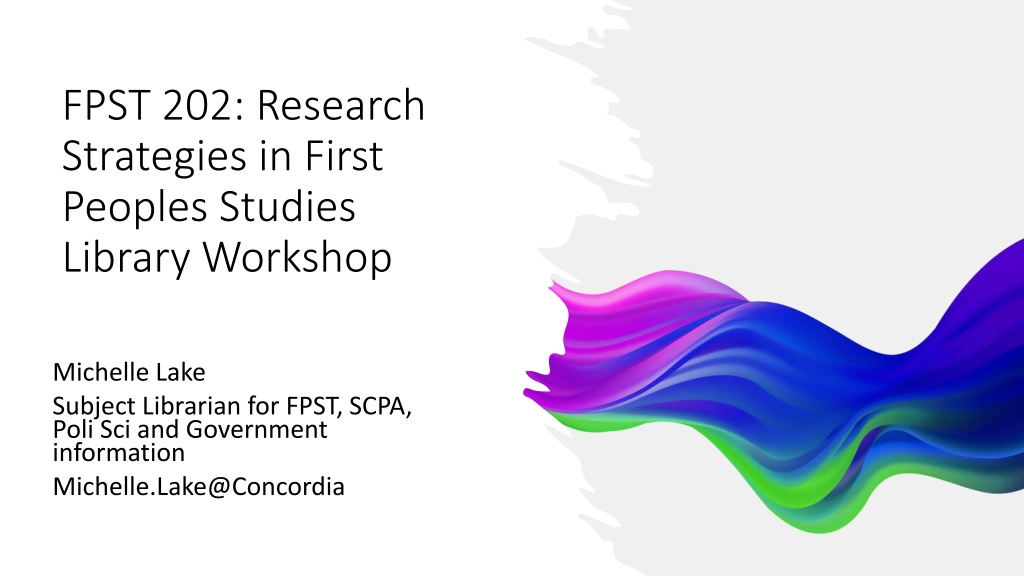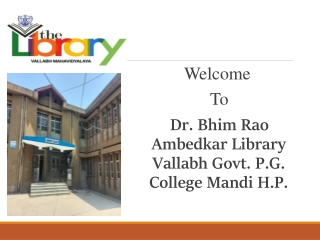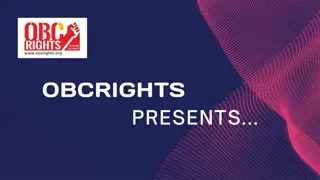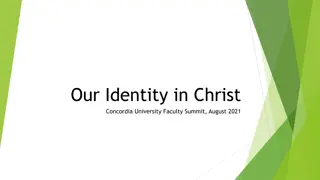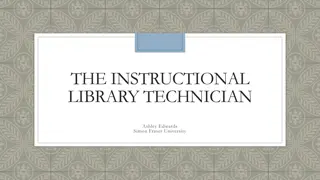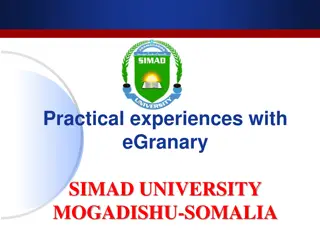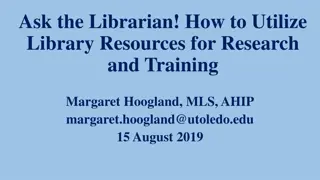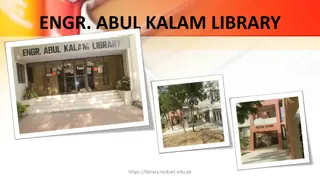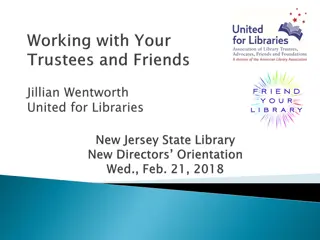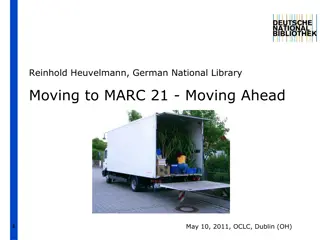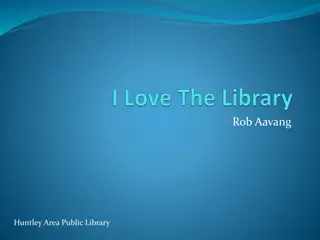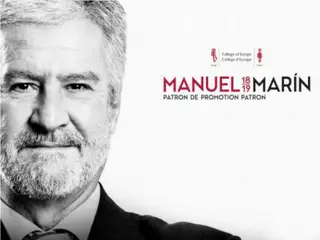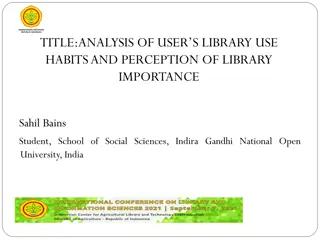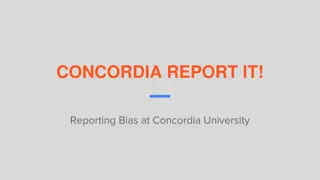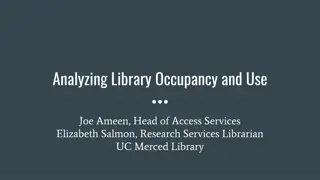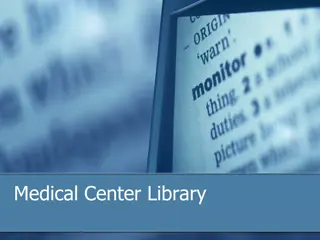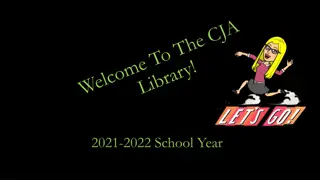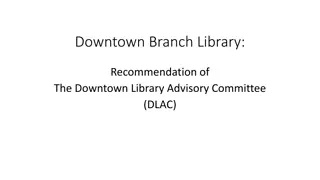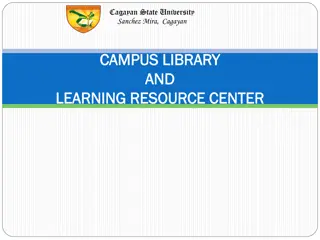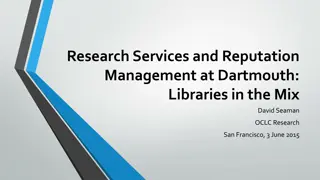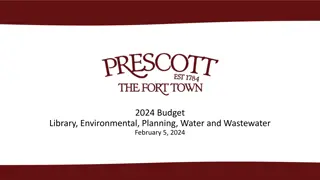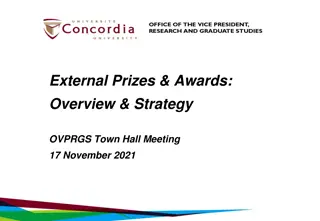Library Services and Resources Overview at Concordia University
Michelle Lake, Subject Librarian for First Peoples Studies and Political Science at Concordia, provides research support, guides students in navigating library resources, and assists with source evaluation and citation issues. The library offers 24/7 access, course reserves, and a range of services such as borrowing books and technology with student cards.
Download Presentation

Please find below an Image/Link to download the presentation.
The content on the website is provided AS IS for your information and personal use only. It may not be sold, licensed, or shared on other websites without obtaining consent from the author. Download presentation by click this link. If you encounter any issues during the download, it is possible that the publisher has removed the file from their server.
E N D
Presentation Transcript
FPST 202: Research Strategies in First Peoples Studies Library Workshop Michelle Lake Subject Librarian for FPST, SCPA, Poli Sci and Government information Michelle.Lake@Concordia
Michelle Lake, librarian for Political Science, the School of Community and Public Affairs, First Peoples Studies, and Government Publications Settler, originally from Ontario. My hometown is located on the traditional territories of the Erie, Neutral, Huron-Wendat, Haudenosaunee and Mississaugas, on land covered by the Dish With One Spoon Wampum Belt Covenant. Who am I? I live and work on the unceded Indigenous lands of Tiohti :ke, where the Kanien keh :ka Nation is recognized as the custodians of those lands and waters.
BA, University of Guelph, MA Western University 15 years working at Concordia Library 12 years in my current position, Subject librarian for First Peoples Studies, SCPA, Political Science & Government Information I am still always learning and working to decolonize my own practice as a librarian Who am I?
What do I do? Provide research support, teach and assist with search strategies Help students navigate library databases Help students find and access materials they need Assist with evaluation of sources Build guides, resources and pathfinders to help students locate research materials Help with citation issues Choose the books we buy for my subject areas: First Peoples studies, political science, public policy, community and public affairs and government information
The Librar(ies) 24/7 access, with student card, after 11pm Webster Library (LB) downtown on SGW campus & Vanier Library (VL) on Loyola campus Webster: Social Sciences, Humanities, Business, Engineering & Fine Arts Vanier: Science(s), Health, Communications, Journalism and Psychology Course Reserves Room(s): have the required undergraduate print textbooks for the courses taught at that campus (for example: Webster has the FPST, Political Science and SCPA course reserves)
Library Services Your student card is your library card. You need it to: borrow books (up to 100 a time) borrow a laptop and other technology (for 24 hours) print on campus (add money to your Dprint account) access the library overnight during 24/7 hours. Webster library has 5 book scanners (And Vanier has 2!) that can be used for free to scan chapters from our print books and email them to yourself as a PDF. To use Library databases, access online articles and ebooks when you are off campus, login with your MyConcordia Netname and password.
Use the Sofia Discovery tool to find print books, ebooks, and journal articles from the library.
How can I find out if the library has access to an item I m looking for?
Wilson, S. (2008). Research is ceremony: Indigenous research methods. Halifax: Fernwood Publishing.
This is a required textbook, so it is found in the course reserves room for a 3 hour loan. There is a book scanner in the course reserves room, where you can scan chapters and email them to yourself for free.
Kovach, M. (2019). Conversational method in Indigenous research. First Peoples Child & Family Review, 5(1), 40-48.
Tenorio, R. (2020). Indigenizing Research Participant Recruitment. In E.S. Huaman & N.D. Martin (Eds). Indigenous Knowledge Systems and Research Methodologies: local solutions and global opportunities. (pp. 145-164). Canadian Scholars.
Tilley, Susan A.(2016). Doing respectful research: power, privilege and passion. Winnipeg: Fernwood Publishing
Your Turn! Your Turn! **Hint: Use the Sofia Discovery Tool on the Concordia Library website: https://library.concordia .ca/ Find and identify the sources. Individually or in pairs
Context searching for Indigenous scholarship in an academic library
Education, as controlled and imposed by the church, federal and provincial governments in Canada has been a destructive force in Indigenous communities Indigenous Peoples and education in Canada Research at the university level, about Indigenous Peoples and communities has been harmful Libraries, as part of the University and education system, are also colonial institutions, with barriers, biases and impediments to enhancing Indigenous scholarship and voices
Universities & libraries are colonial institutions While Indigenous people have necessarily (and effectively) engaged with Western institutions, it is important to remember that this necessity came about largely due to a need to respond to colonial impositions. Colonizers wanted Indigenous lands, and ultimately found imposing institutions to be a most effective way of stealing that land. Tuck, E. & Yang, K.W. (2012). Decolonization is not a metaphor. Decolonization: Indigeneity, Education & Society, 1(1), 5-6. https://jps.library.utoronto.ca/index.php/des/article/view/18630/15554
When we look at collections, the actual information contained in libraries and how it is organized, we can see that it (surely by accident) somehow manages to construct a reality wherein whiteness is default, normal, civilized and everything else is Other. The library is always an ideological structure. It s not just what goes into the library that matters, but how it s organized and under which norms. Colonial institutions as ideological structure Daniel Heath Justice, Ph.D, ACRL Choice Webinar: Indigenous Literatures, social justice and the decolonial library (2019) nina de jesus, Locating the library in institutional oppression, In the library with the lead pipe (Sept 24, 2014)
E, F and FC books are here Call number ranges: E 75 E 99 Indigenous Peoples in North America F 1-1140 History of British America (Canada) FC 1-4200 Canada
Classification: Classification: browse the bookshelves On the library shelves, most books about First Nations, Inuit, and M tis peoples and thought are found in the E classification area, for Historyof North America .This represents an erasure of living peoples, philosophies, and knowledge.
Terminology In the most common university library classification system, Library of Congress Subject Headings (LCSH), the main subject heading for material about Indigenous peoples in Canada and the United States is Indians of North America . The term Indigenous is still new in these systems. Though relevant and correct, terms for nations such as the Kanien keh :kaor confederacies such as the Haudenosaunee are far less prevalent in our Sofia Discovery tool than terms such as Mohawk or Iroquois.
Terminology Terminology: what about the subjects? These books were published in 2019 and 2020 and are about contemporary issues involving Indigenous peoples in Canada and Indigenous activism regarding climate change. However, they are classified within the subject heading: Indians of North America
Terminology: what about the subjects? Until recently, the subject heading Residential School was less common than subject headings such as: Off-reservation boarding schools - Canada Indians of North America - Education
Terminology Government The government departments responsible for relations with Indigenous peoples in Canada, has changed 9 times the country s colonial history. 1860 - Dept of Crown Lands & Hudson's Bay Company, 1873 Dept of the Interior, 1880 Dept of Indian Affairs, 1936 Dept of Mines & resources, 1949 Citizenship & Immigration, 1965 Northern Affairs and National resources, 1966 Indian Affairs and Northern Development Current departments: 2017- Indigenous Services Canada (ISC) and Crown-Indigenous Relations and Northern Affairs Canada (CIRNAC).
Indigenous Aboriginal Native** Indian (legal significance) First Nations, M tis, Inuit First peoples Autochtone (native) Autochtones (indigenous) Am rindien (Indian) Regional differences: Keywords and subjects for searching scholarly literature Aboriginal: Australia & Canada Native American or American Indian: U.S. First Nations: Canada Indigenous: international
Language matters Oka Crisis government, western scholars, and western journalists Oka resistance, Oka uprising, Oka revolt Indigenous scholars, Indigenous perspectives Kanehsatake Resistance specificity
There is a tension between finding keywords and subjects that will result in the most comprehensive search, and the terminology or way of speaking and writing about Indigenous Peoples, knowledges, and worldviews respectfully. Pause.
Strategies to locate Indigenous Scholars and other research in library databses
Choosing and developing a topic
Possible topics I m interested in Indigenous studies in higher education I d like to know how land-based education is being incorporated into pedagogy at the university level I want to know how Indigenizing and decolonizing efforts are being integrated into university curriculum
Identifying keywords My key concepts Alternative or related terms Indigenous studies First Peoples Studies Land-based learning/Place based education Post-secondary Teaching Reconciliation Land-based education Higher education/University Pedagogy/curriculum Indigenizing Decolonizing
How do we combine keywords for the best possible results? OR: allow you to insert synonyms or alternative terms and increases your results AND: combines concepts and limits your results youth OR teens Indigenous AND education land OR territory
How do we combine search words for the best possible results? quotation marks : If you put two or more words in quotation marks, that exact phrase will be searched and limits your results. * - when you add an asterisk on the end of a word, your results will contain all the words with those endings or suffix Democra* First Nations Finds: democracy, democracies, democratization, etc. public policy Canad* Finds: Canada, Canadian
Avoid searching with linking or unnecessary words Effects Impact Consequences Influence Results Importance Significance Response Emphasis Causes Each author may use different linking words when discussing similar topics. You don t want your search to be limited to those books and articles that only contain the word effect or consequence
How do you start your research? Where do you look first?
Next steps. Combine the keywords with AND/OR Search for them in a database to find sources for my research What s the best place to search? Sofia Discovery Tool: all the ebooks and print books at Concordia Library, journal articles from many disciplines, government documents and print books in collections outside of Concordia Academic Search Complete (EBSCO): a journal article database with articles from multiple disciplines and good limiters, plus the opportunity to combine searches iPortal: an Indigenous focused research portal with journal articles Google Scholar: an academic database of journal articles, fewer limiters, wide scope
Searching for some of the main concepts I identified Keeping my search broad, to see what is out there AND/OR need to be in ALL CAPS in Sofia I can add concepts, as I develop my search In Sofia, we are searching through books and articles, books can be searched more broadly because we are searching through titles, subjects and table of contents
All books in the library are arranged by subject and will have subjects listed in their book record. Clicking on one of these subjects will find all the books and some articles that have the same subject attached, at the library.
Who wrote the book? Scholarly books often have editors and each chapter will have different authors You should look for Contributors , which will have a list of individual chapter authors, and their biographies either at the beginning or very end of the book How do we locate Indigenous authors? If a book has one author, look for about the author section or even skim the introduction, where the author will describe themselves
Who wrote the book? The table of contents might also have author information, in the case of Indigenous authors their community or nation may be in brackets following their name How do we locate Indigenous authors? Indigenous scholars and authors are very likely to self-identify, with details about their nation or community in prefaces, introductions, etc.
